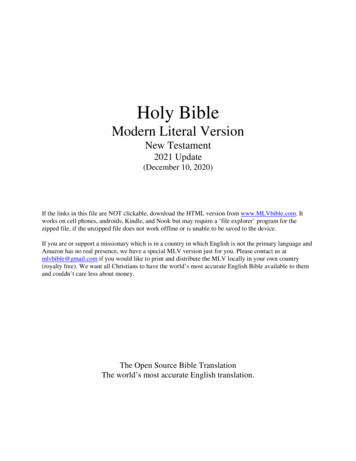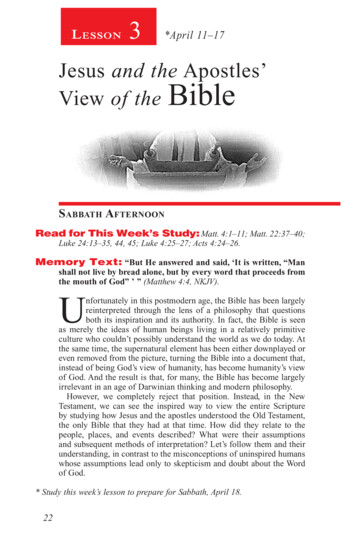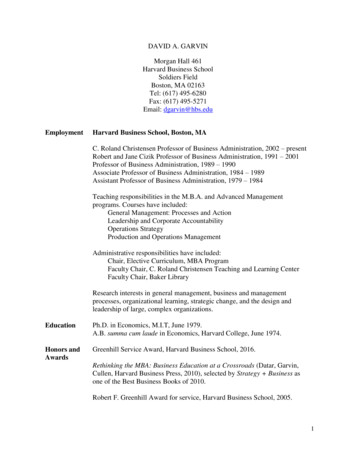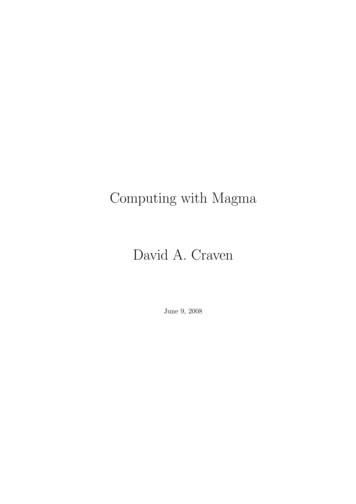
Transcription
Commentary onthe Book of GenesisBible Study Notes and Commentsby David E. PratteAvailable in print atwww.gospelway.com/sales
Commentary on the Book of Genesis:Bible Study Notes and Comments Copyright David E. Pratte, 2010, 2013Minor revisions 2016All rights reservedISBN-13: 978-1492270362ISBN-10: 1492270369Note carefully: No teaching in any of our materials isintended or should ever be construed to justify or to in anyway incite or encourage personal vengeance or physicalviolence against any person.Front page photo:Mt. Ararat, where Noah’s ark rested after the flood.“Then the ark rested in the seventh month, the seventeenth day of themonth, on the mountains of Ararat” - Genesis 8:4Photo credit: MEDIACRAT distributed under Creative Commonslicense, via Wikimedia CommonsOther AcknowledgementsUnless otherwise indicated, Scripture quotations are generally from theNew King James Version (NKJV), copyright 1982, 1988 by Thomas Nelson,Inc. used by permission. All rights reserved.Scripture quotations marked (NASB) are from Holy Bible, NewAmerican Standard La Habra, CA: The Lockman Foundation, 1995.Scripture quotations marked (ESV) are from The Holy Bible, EnglishStandard Version, copyright 2001 by Crossway Bibles, a publishingministry of Good News Publishers. Used by permission. All rights reserved.Scripture quotations marked (MLV) are from Modern Literal Versionof The New Testament, Copyright 1999 by G. Allen Walker.Scripture quotations marked (RSV) are from the Revised StandardVersion of the Bible, copyright 1952 by the Division of Christian Education,National Council of the Churches of Christ in the United States of America.Scripture quotations marked (NIV) are from the New InternationalVersion of the Holy Bible, copyright 1978 by Zondervan Bible publishers,Grand Rapids, Michigan.Study Notes on GenesisPage #2
Other Books by the AuthorTopical Bible StudiesGrowing a Godly Marriage & Raising Godly ChildrenWhy Believe in God, Jesus, and the Bible? (evidences)The God of the Bible (study of the Father, Son, and Holy Spirit)Grace, Faith, and Obedience: The Gospel or Calvinism?Kingdom of Christ: Future Millennium or Present Spiritual Reign?Do Not Sin Against the Child: Abortion, Unborn Life, & the BibleTrue Words of God: Bible Inspiration and PreservationCommentaries on Bible BooksGenesisJoshua and RuthJudges1 SamuelEzra, Nehemiah, and EstherJobProverbsGospel of MarkGospel of JohnActsRomansEphesiansPhilippians and ColossiansHebrews1 & 2 PeterBible Question Class BooksGenesisJoshua and RuthJudges1 SamuelEzra, Nehemiah, and EstherJobProverbsEcclesiastesIsaiahGospel of MatthewGospel of MarkGospel of LukeGospel of JohnActsRomans1 Corinthians2 Corinthians and GalatiansEphesians and PhilippiansColossians, 1&2 Thessalonians1 & 2 Timothy, Titus, PhilemonHebrewsGeneral Epistles (James – Jude)RevelationWorkbooks with Study NotesJesus Is Lord: Workbook on the Fundamentals of the Gospel of ChristFollowing Jesus: Workbook on DiscipleshipGod’s Eternal Purpose in Christ: Workbook on the Theme of the BibleVisit our website at www.gospelway.com/sales to see acurrent list of books in print.Page #3Study Notes on Genesis
Other Resources from the AuthorPrinted books, booklets, and tracts available atwww.gospelway.com/salesFree Bible study articles online atwww.gospelway.comFree Bible courses online atwww.biblestudylessons.comFree class books atwww.biblestudylessons.com/classbooksFree commentaries on Bible books atwww.gospelway.com/commentaryContact the author atwww.gospelway.com/commentsStudy Notes on GenesisPage #4
Table of ContentsGenesis 1. 9Genesis 2 . 37Genesis 3 .54Genesis 4 . 69Genesis 5 . 80Genesis 6 . 85Genesis 7 . 99Genesis 8 . 106Genesis 9 . 113Genesis 10 . 124Genesis 11 . 128Genesis 12 . 133Genesis 13. 141Genesis 14 . 145Genesis 15. 151Genesis 16 . 157Genesis 17 . 162Genesis 18 . 169Genesis 19 . 176Genesis 20 . 186Genesis 21 . 190Genesis 22 . 198Genesis 23 . 205Genesis 24 . 208Genesis 25 . 220Genesis 26 . 229Genesis 27 . 237Genesis 28 .252Genesis 29 . 258Genesis 30 . 268Genesis 31.276Genesis 32 . 289Genesis 33 . 296Genesis 34 . 301Genesis 35 . 310Genesis 36 . 317Genesis 37 . 320Genesis 38 . 330Genesis 39 . 338Genesis 40 . 346Genesis 41 . 350Genesis 42 . 357Genesis 43 . 363Genesis 44 . 368Page #5Study Notes on Genesis
Genesis 45 . 373Genesis 46 .379Genesis 47 . 383Genesis 48 . 390Genesis 49 .395Genesis 50 . 402(Due to printer reformatting, the above numbers may be off a few pages.)Notes to the ReaderTo save space and for other reasons, I have chosen not to includethe Bible text in these notes (please use your Bible to follow along). WhenI do quote a Scripture, I generally quote the New King James Version,unless otherwise indicated. Often – especially when I do not usequotations marks – I am not quoting any translation but simplyparaphrasing the passage in my own words. Also, when I ask the readerto refer to a map, please consult the maps at the back of your Bible or ina Bible dictionary.You can find study questions to accompany these notes atwww.gospelway.com/salesTo join our mailing list to be informed of new books orspecial sales, contact the author atwww.gospelway.com/commentsStudy Notes on GenesisPage #6
Introductory Thoughts aboutCommentariesOnly the Scriptures provide an infallible, authoritatively inspiredrevelation of God’s will for man (2 Timothy 3:16,17). It follows that thiscommentary, like all commentaries, was written by an uninspired,fallible human. It is the author’s effort to share his insights about God’sword for the purpose of instructing and edifying others in the knowledgeand wisdom found in Scripture. It is simply another form of teaching,like public preaching, Bible class teaching, etc., except in written form(like tracts, Bible class literature, etc.). Nehemiah 8:8; Ephesians4:15,16; Romans 15:14; 1 Thessalonians 5:11; Hebrews 3:12-14; 5:12-14;10:23-25; Romans 10:17; Mark 16:15,16; Acts 8:4; 2 Timothy 2:2,24-26;4:2-4; 1 Peter 3:15.It follows that the student must read any commentary withdiscernment, realizing that any fallible teacher may err, whether he isteaching orally or in writing. So, the student must compare all spiritualteaching to the truth of God’s word (Acts 17:11). It may be wise to readseveral commentaries to consider alternative views on difficult points.But it is especially important to consider the reasons or evidence eachauthor gives for his views, then compare them to the Bible.For these reasons, the author urges the reader to alwaysconsider my comments in light of Scripture. Accept what Isay only if you find that it harmonizes with God’s word. Andplease do not cite my writings as authority, as though peopleshould accept anything I say as authoritative. Always let theBible be your authority.“He who glories, let him glory in the Lord”– 1 Corinthians 1:31Page #7Study Notes on Genesis
Abbreviations Used in These NotesASV – American Standard Versionb/c/v - book, chapter, and verseESV – English Standard Versionf - the following verseff - the following versesKJV – King James VersionNASB – New American Standard BibleNEB – New English BibleNIV – New International VersionNKJV – New King James VersionRSV – Revised Standard VersionStudy Notes on GenesisPage #8
Genesis 1Introduction to the Book of GenesisName and theme“Genesis” means origin or beginning. The book is the account of thebeginning of the earth, mankind, and God’s dealings with man. It is theearliest history we have of the earth and of God’s relationships to men.As such, it is foundational to our understanding of many major Biblethemes. Many events cited elsewhere in Scripture are first mentionedand described in detail in the book of Genesis and would be very hard tounderstand without Genesis.Morris (p. 18f) offers a list of things the beginning of which arerecorded in Genesis, including the following: The universe, life, man,marriage, evil, language, civilization, nations, religion, and the promisesto Abraham regarding his descendants (Israel).Horne reminds us that Moses wrote this inspired record over 2000years after the creation and many other events in the book actuallyoccurred. At the time Moses wrote, the nations surrounding Israel weresteeped in idolatry, especially in the land of Canaan that they werepromised to receive as an inheritance. In contrast to the fables andmyths of idolatry, the record of Genesis served to give a true account ofthe character and nature of the true God, the true record of the creationof earth and mankind, the origin of sin and of God’s plan to providesalvation for mankind, including the role of the nation of Israel in thatplan.AuthorEvidence for Moses as authorGenesis is part of the Pentateuch, the first five books of the OldTestament. The Bible often speaks of the “law” as written by Moses.None of these passages refers directly to Genesis, however Genesis isclearly included in the law and is the beginning installment in the storythat continues in the following books. See Exodus 17:14; 24:4,7; 34:27;Numbers 33:2; Deut. 31:9,22,24; Joshua 8:31,32; Judges 3:4; Mark10:4,5; John 5:46,47; Acts 3:22; Romans 10:5 (compare Joshua 1:8;8:34; 22:9; 23:6; 14:2; Daniel 9:12,13; Mark 12:19; John 1:45; 7:19).The only people who deny Mosaic authorship are liberals whoundermine the authority and inspiration of the book, especially thosePage #9Study Notes on Genesis
who do not accept the teaching of the book regarding creation, theworldwide flood, etc.Evidence that writing existed in Moses’ daySome have denied Moses could have written the Pentateuchbecause writing had not been invented in Moses’ day (1450 BC). Such aview flatly denies the inspiration of Scripture, since the Bible repeatedlystates that Moses did write various books of the Pentateuch. However,archeology has now conclusively proved that writing was known longbefore Moses’ day.Specifically, Waldron explains that 100,000 clay tablets were foundat Nuzi and dated at 1700-2000 BC, more than 250 years before Moses.Halley’s Handbook (pp 48-55) lists many examples of ancientwritings, discovered by archaeologists, that date to Moses’ day andbefore, some dating even back to Abraham’s time! (See archaeologicalnotes on Genesis 12.) Here are a few quotations:Ras Shamra (Ugarit), North of Sidon, near Antioch . [a] FrenchExpedition (1929-) found a Temple Library . with vast quantitiesof tablets . in 8 languages . and an alphabet of 27 letters farearlier than any previously known, many of them dating from themiddle of second millennium B.C.Thus, it is certain that writing was in common use in Palestine,Sinai, Syria, and Phoenicia, for centuries before the days of Moses.Dr. W. F. Albright, leading authority on Palestinian archaeology,says, “Only a very ignorant person can now suggest that writing(in many forms) was not known in Palestine and the immediatelysurrounding regions during the entire second millennium B.C.”(pp 54,55)BC!Remember that Moses lived in the middle of the second millenniumThe Documentary HypothesisThe Documentary Hypothesis or Graf-Wellhausen Theory statesthat different parts of the Pentateuch (not just Genesis but thePentateuch) must have originally been written by different uninspiredauthors, whose writings may have been collected by some editors (calledredactors) long after Moses died. This view is said to be necessary toexplain supposed contradictions and different writing styles found indifferent sections of the books. But such a theory proves nothing. Manywriters use different styles at different times for different purposes. Suchan approach could just as easily be used to “prove” that modern bookswere written by more than one author despite the fact we know each onewas written by just one author.Of course, it is possible that Moses was aware of other sources forsome of his information (oral traditions), even as Luke and others didStudy Notes on GenesisPage #10
(Luke 1:1-4). However, this must never be used (as defenders of theDocumentary Hypothesis do) to cast doubt on the inspiration of thePentateuch or to argue that Moses is not the fundamental human author.Using sources no more proves Moses did not write the Pentateuch thanit would prove that Luke did not write the book of Luke or that modernwriters did not write their books just because they cite or refer to sources.For excellent evidence against the Documentary Hypothesis seeCoffman’s introduction. See also Holden and Geisler, pages 50,59. Hereis a summary of the evidence:* Writers who seriously defend this view invariably are liberaltheologians. Coffman argues that one can search the writings of thosewho defend the Documentary Hypothesis and never find a singlestatement that affirms the Bible to be the inspired word of God.* There is no historical evidence that the manuscripts allegedly usedas sources ever really existed. None of them have ever been found nor doany other ancient manuscripts refer to them. Those who defend thetheory confidently affirm their existence, but only because it fits theirtheory. They did not find the manuscripts and then deduce the theory,nor have they ever found the manuscripts even after concocting thetheory. Evidence that contradicts the theory is ignored.* One of the main arguments for the hypothesis is that differentsections use different names for God. However, Coffman demonstratesat great length that many sections use the various namesinterchangeably even in close proximity, and that various names areoften used in sections that are supposedly characterized by use of adifferent name.* Those who defend the hypothesis disagree widely regarding whatauthors allegedly wrote what sections, they often admit that the authorsfor some sections are difficult or impossible to identify, and they evenadmit that there are sections for which the evidence contradicts theirtheory. Coffman documents such instances at great length.* More important, the theory denies that Moses wrote thePentateuch, in flat contradiction to direct statements of Scripture thathe did write it (see list above). Such a view effectively denies theinspiration of most of the Bible, including the teachings of Jesus.* And above all, the theory becomes a justification for denying theinspired infallibility of the Pentateuch. When men don’t believe somestatement of Scripture (especially the miracles), they just dismiss it as amistake or legend/myth, etc. The effect leads to denial of the inspirationof all Scripture. See Matthew 15:3,4; 22:29-32; 2 Peter 1:20,21; 2Timothy 3:16,17; Exodus 24:3-7; 34:27; Deuteronomy 31:9,22,24; 18:1822; Judges 3:4; Joshua 22:9; 14:2; Daniel 9:11-13.The Bible states that Moses wrote the books of the law and gives noother view. To argue otherwise is to simply deny Scripture. Why botherto claim to be a Bible believer when you deny its teaching? Note JohnPage #11Study Notes on Genesis
5:46,47 – Jesus asked how people could believe His words if they wereunwilling to believe what Moses wrote!See Coffman’s introduction for his detailed discussion.Genesis as historyThe only proper approach to Genesis is to view it as divinelyinspired history. Its accounts should be viewed as history, accurate andliteral just like all other Biblical history, including Acts, Matthew, etc. Itis not legend or myth, nor is it symbolic (except for occasional symbolsthat are understood by the same means as any other occasional symbolin a book of history). For many topics it discusses, it is the only accuratewritten history, since it gives the account of the only One (God) who waspresent and has given a written eyewitness account.Efforts to view the book as mere legend, especially chapters 1-11, arevain. Consider the following evidence that Genesis should be recognizedas history, not myth, legend, or a book of symbols.(1) Other books of the Bible, including statements fromJesus, treat Genesis (specifically the first 11 chapters) asinspired, historical fact.We will note many examples as we study. Morris (p. 21) states:“There are at least 165 passages in Genesis that are either directlyquoted or clearly referred to in the New Testament. Many of theseare alluded to more than once, so that there are at least twohundred quotations or allusions to Genesis in the New Testament there exist over one hundred quotations or direct references toGenesis 1-11 in the New Testament. Furthermore, every one ofthese eleven chapters is alluded to somewhere in the NewTestament, and every one of the New Testament authors referssomewhere in his writings to Genesis 1-11. On at least six differentoccasions, Jesus Christ Himself quoted from or referred tosomething or someone in one of these chapters, including specificreference to each of the first seven chapters.”We will see that Adam, Abel, Noah, and Abraham and other Genesischaracters are named in other books of the Bible and treated as realcharacters just as surely as later characters of both the Old Testamentand New Testament.(2) Genesis has been repeatedly confirmed by archeologyand other proofs but has never been proved wrong by anyhistorical, geographical, or scientific proof.Genesis conflicts with human opinion such as evolution, but neverdoes it conflict with any proved fact. Much of the book has beenconfirmed but never disproved by science and archeology. We will citemany examples as we proceed through the book.Holden and Geisler (page 74) state: “While literally thousands offinds have validated the persons and events presented in the OldStudy Notes on GenesisPage #12
Testament, not a single archaeological find has refuted anything in thePentateuch.”(3) People generally can distinguish whether a writing isintended to be history or myth.Coffman observes that no known society has ever generallyaccepted as history any writing that was in fact not history but myth.Societies have myths, but they are able to distinguish them from thatwhich professes to be history. We have Paul Bunyan and Mother Goose,but we don’t confuse them with real historical characters or events suchas Christopher Columbus or the Revolutionary War. What is presentedas history may be mistaken or even demonstrably false (such as the Bookof Mormon), but people can still recognize that it claims to be history,not myth. Genesis is repeatedly portrayed as history.(4) One identifying characteristic of that which purportsto be history is the use of genealogies.History deals with people and places by name as well as with realevents. But inclusion of genealogies clearly defines a work as professingto be history because genealogies have no purpose whatever excepthistory. The book of Genesis manifestly contains several genealogies,including several lengthy ones in chapters 1-11 (see chapters 5,10,11).(5) Genesis 12-50
True Words of God: Bible Inspiration and Preservation Commentaries on Bible Books Genesis Joshua and Ruth Judges 1 Samuel Ezra, Nehemiah, and Esther Job Proverbs Gospel of Mark Gospel of John Acts Romans Ephesians Philippians and Colossians Hebrews 1 & 2 Peter Bible Que











